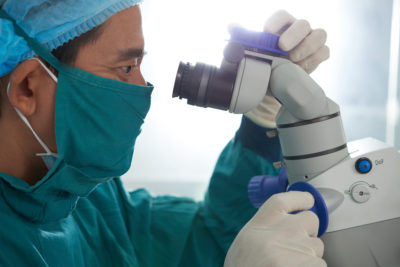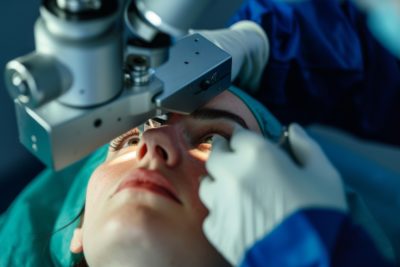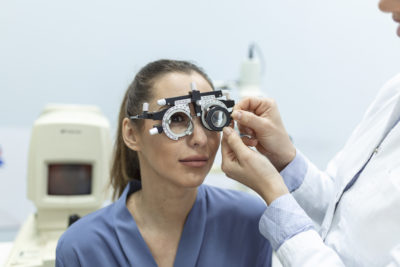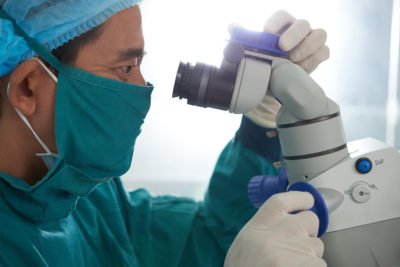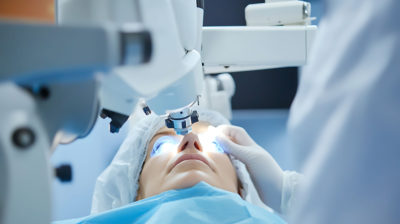Many a times you visit your eye doctor for some vision related problems, some retina problem is detected, a few tests are performed on your eyes and then you are advised to get Retina Laser done to control/treat your retina eye problem! This is a common scenario for many people today who have some or the other retinal disease like diabetic retinopathy, retinal holes etc.
Retina laser is one of commonest OPD procedures done in an eye hospital. Very often I get asked a lot of questions related to what’s and how’s of Retina Laser. I remember a very special person Mr. Singh. He was a scientist and had a very analytical mind to everything. He was diagnosed with Diabetic retinopathy. We performed several tests on his eyes to determine the right treatment for his retina. OCT, Retinal angiography among others were performed. After looking at all the reports, I planned a retina laser called PRP to control and halt the progression of his diabetic retinopathy. He asked me a series of questions related to his planned laser treatment of the retina:
- What are some of the other retina-related conditions that require laser treatment?
- How is the Retina laser procedure done?
- How safe is Retina laser?
- What are precautions I will have to take after Retina laser?
- How does retina laser work?
In this blog I am briefly going to clear common doubts about retina lasers with the aim of clearing doubts for people like Mr. Singh.
Laser is nothing but a light of specific wavelength. There are two main type of lasers used in treatment of Retina diseases according to their spectral wavelength i.e. Green and Yellow. Most commonly used laser among the two is called ARGON GREEN LASER. This laser has frequency of 532nm. There are several other lasers besides above two which may be used in treatment of retinal diseases such as diode laser, multicolor lasers, Kyrpton laser, Yellow micro pulse lasers etc.
What Are the Different Retinal Diseases for Which Retina Lasers Are Used?
-
Diabetic Retinopathy:
- Retinal lasers are used to seal or destroy abnormal blood vessels in the retina.
- It helps in preventing further leakage and preserving vision.
-
Retinal Tears or Detachments:
- The laser seals tears in the retina to prevent detachment.
- Creates a scar around the tear to secure it in place.
-
Macular Edema:
- Used to reduce swelling in the macula, improving vision.
-
Age-Related Macular Degeneration (AMD):
- Applied to eliminate abnormal blood vessels and reduce vision loss.
-
Central Serous Retinopathy:
- Helps in sealing leaks under the retina caused by fluid buildup.
What is Green Laser Treatment for Eyes?
-
Explanation:
- The green laser, also known as argon laser treatment, is commonly used for various retinal conditions.
- This laser emits green light that is absorbed by the retina to create thermal burns or seals without damaging other parts of the eye.
-
Uses:
- Treats diabetic retinopathy by sealing leaking blood vessels.
- Repairs retinal tears to prevent detachment.
- Reduces abnormal blood vessel growth in conditions like AMD.
-
Advantages:
- Minimally invasive with no surgical cuts.
- Effective in reducing further damage and preserving vision.
-
Process:
- A numbing drop is used before the procedure.
- A focused green laser beam is directed to the retina.
- The treatment usually takes 20-30 minutes with minimal discomfort.
How Retina Laser Works?
-
Explanation:
- Retinal lasers use precise light beams to target the retina.
- The laser creates tiny burns or scars to treat retinal conditions.
- It helps seal leaking blood vessels or secure retinal tears.
-
Procedure:
- Performed as an outpatient treatment.
- The eye is numbed, and the laser is applied with precision.
- Quick recovery time with no need for hospitalization.
-
Outcome:
- Prevents further damage to the retina and stabilizes vision.
How is Retina Laser done?
It is an outpatient procedure and does not need hospital admission. It is done under topical anesthesia by instillation of eye drops. It can be done in sitting or in lying down position. Mild pricking sensation may be experienced by some patients during the procedure. Depending on the area lasered it usually takes anywhere from 5-20 minutes.
What Are the Do’s and Don’ts After the Retinal Laser Procedure?
Do’s After Retinal Laser Procedure
- Use prescribed eye drops as directed to manage inflammation and prevent infection.
- Rest your eyes and avoid strenuous activities for the first 24–48 hours.
- Attend all follow-up appointments to monitor healing and results.
- Wear sunglasses when outdoors to protect your eyes from bright light.
- Inform your doctor immediately if you experience sudden vision changes or discomfort.
Don’ts After Retinal Laser Procedure
- Avoid rubbing or touching your eyes, as this can lead to irritation or infection.
- Refrain from heavy lifting or intense physical activities for at least a week.
- Do not use eye makeup or contact lenses until cleared by your doctor.
- Avoid driving immediately after the procedure if your vision is blurry.
- Steer clear of exposure to dust or smoke to prevent eye irritation.
How Long Does It Take for a Retina to Heal After Laser Treatment?
- Healing time can vary from a few days to several weeks depending on the severity of the condition.
-
Immediate Effects:
- Vision may be blurry for a few hours or days after the procedure.
-
Gradual Improvement:
- Most patients notice stabilization or improvement in vision within 2–4 weeks.
-
Factors Influencing Healing:
- Overall eye health, adherence to post-operative care, and the extent of retinal damage.
-
Key Tips:
- Follow your doctor’s instructions closely and avoid activities that strain the eyes.
What Are the Side Effects of Retinal Eye Surgery?
-
Common Side Effects:
- Temporary blurry vision.
- Mild discomfort or irritation in the treated eye.
- Sensitivity to light for a few days.
-
Rare but Serious Side Effects:
- Swelling or inflammation in the eye.
- Vision changes or reduced peripheral vision.
- Risk of retinal detachment if the procedure is not successful.
-
Management:
- Use prescribed medications and report any unusual symptoms to your doctor.
Who Should Avoid Retinal Laser Surgery?
-
Patients with Certain Conditions:
- Those with advanced retinal detachment that cannot be treated with lasers.
- Individuals with severe cataracts, as the laser may not effectively penetrate.
-
Unstable Eye Health:
- Patients with infections or inflammation in the eye.
-
Pregnant Women:
- Caution is advised due to potential risks, and alternative treatments may be recommended.
